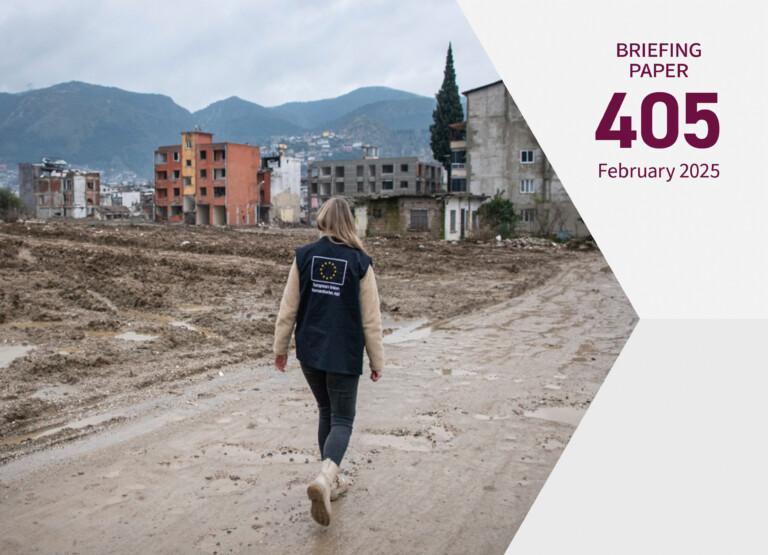Kiina on nostanut panoksiaan ihmisoikeushallinnossa. Se on järjestelmällisesti pyrkinyt syrjäyttämään ihmisoikeudet kansainvälisen järjestyksen keskiöstä tuomalla esiin vaihtoehtoisia ihmisoikeuskäsitteitä, estämällä ihmisoikeuksia edistävää rahoitusta YK:ssa ja haittaamalla kansalaisyhteiskunnan osallistumista ihmisoikeuksien valvontaan.
Kiinan ihmisoikeusnäkökulmaa eivät ohjaa vain kokemus menneistä nöyryytyksistä ja developmentalismin aate, vaan ennen kaikkea tahto turvata nykyinen poliittinen järjestelmä ja sen johto.
Vaihtoehtoinen ihmisoikeusjärjestelmä rakentuu vapaaehtoisen yhteistyön varaan kovien laillisten velvoitteiden ja kansainvälisen valvonnan sijaan. Se edistää vuoropuhelua ja valmiuksien kehittämistä syyttelyn ja häpäisemisen sijaan.
Ihmisoikeuksia kannattavien valtioiden tulisi vastata Kiinan toimiin Ihmisoikeusneuvostossa ja YK:ssa laajemmin. Ne voivat nostaa esiin ihmisoikeuksiin kohdistuvia järjestelmällisiä hyökkäyksiä, lisätä tietoa Kiinan ulkopolitiikan tavoitteista ja luoda käytäntöjä yhteisten kantojen muodostamiseksi.
Introduction
Human rights protection within the UN has recently been affected by major powers changing their policies, which have not been for the better from the point of view of safeguarding human rights. This particularly concerns the international organization’s chief human rights body, the Human Rights Council (HRC), whose task is to promote and protect human rights around the world. The United States announced its withdrawal from the HRC in June 2018, duly opening up space for states seeking more input and leverage in the formulation and oversight of the human rights regime. China has readily sought to fill the void left by the United States in the HRC, but it has also more broadly attacked different human rights components in the UN, triggering claims that China, along with Russia, is waging war against human rights. Be that as it may, it nevertheless appears clear that China has become more proactive in the human rights sphere.
The aim of this Briefing Paper is to take stock of China’s recent activities in the UN on human rights with a particular focus on the HRC. It will explore those elements of the existing system that China particularly challenges, as well as on what grounds. The paper will look into China’s alternative human rights agenda, and conclude by investigating the implications of China’s proactivity for the UN human rights system, as well as how states have reacted to it. It will be shown that China is systematically engaged in removing human rights from the centre of the international order, and that an increasing number of states, ranging from other rising powers to undemocratic ones, are actually coalescing around this agenda.
Chinese opposition to human rights
China has conventionally been sceptical about the international legal system in general, and human rights in particular. There are both principled and practical reasons for this suspicion. To start with, many states in Asia have traditionally been cautious about international law and institutions. Their experiences of colonialism and inequality still colour their attitudes, and as rising powers they have been forced to adapt to an international order, the construction of which they did not participate in.1 For China, much of the reluctance towards Western domination and its concomitant international order stems from the so-called century of humiliation, which was embodied in a number of ‘unequal treaties’ that forced China to make concessions on its sovereignty. This period, which extended roughly from the First Opium War in the 1840s to the establishment of Communist China in 1949, marked an end to Chinese domination of East Asia. It forced the Chinese empire to succumb to Western influence in the form of, inter alia, opening up to trade, paying reparations, and giving Britons the right to rule over Hong Kong. As a consequence, China has long viewed international law as a vehicle of political power, which it feels is applied unequally between states.
In 1954, in an effort to respond to the previous experiences of imperialism, and in order for China as well as other developing states to navigate the inter-governmental world more successfully, China developed together with India and Myanmar the Five Principles of Co-Existence. These general principles were first articulated with an exchange of notes in the preamble to the Agreement on Trade and Intercourse between the Tibet region of China and India, or the so-called Panchsheel Treaty, defining the relations between the two countries. According to Chinese claims, the principles generalize the most basic rules of international law, duly laying down: 1) mutual respect for integrity and sovereignty; 2) mutual non-aggression; 3) mutual non-interference in internal affairs; 4) equality and mutual benefit; and 5) peaceful coexistence. Claims by Chinese scholars that the Five Principles are acknowledged by the majority of states are – in substantive terms – partly true, as several international legal instruments, including the UN Charter, contain similar elements of sovereignty and non-interference. However, whereas the principle of sovereignty in international law has been extensively debated and developed, the same does not hold true for the Five Principles, which still remain “very protective of sovereignty and unreceptive to ideas, such as human rights”.2 This wariness of international human rights law has continued throughout the decades following the enunciation of the Five Principles: Asian states have the lowest acceptance vis-à-vis the International Covenant on Civil and Political Rights (ICCPR) and the International Covenant on Economic, Social and Cultural Rights (ICESCR), as well as many other significant human rights treaties.3
Universalism and individualism
One of the main elements of China’s opposition to human rights has traditionally been their universal feature. The UN human rights regime is indeed built upon the idea of universal human rights; according to the Universal Declaration of Human Rights (UDHR) and the main human rights conventions, everyone is entitled to all rights and freedoms without distinction. Formally, China embraces the universality of human rights, although its position can be considered ambiguous: it has been claimed both that China favours ‘cultural relativism’ and hence rejects universalism, and that it does not reject universalism but privileges ‘developmentalism’, thereby leaving the level of human rights protection to be decided by national conditions. Either way, China does not live up to the enjoyment of full and universal rights in practice, and seems to have turned away from universality anew of late. For example, China declared in its national report to the 2018 Universal Periodic Review (UPR) that “[t]here is no universal road for the development of human rights in the world”.
Another key difference between Western and Asian legal culture concerns attitudes towards individualism. As a result of Confucian thinking, Chinese legal culture is more sensitive to communality,4 in contrast to the European individualist tradition, for example. For the Chinese, collectivism is a core value, especially within governing elites.5 In line with this thinking, China has advanced collective human rights, such as the right to self-determination, while also being supportive of the incorporation of new collective rights into the human rights agenda, such as the right to development and the right to peace. Individualistic human rights, particularly civil and political rights, are subordinated to the state and its goals; they should not be construed as a means for individuals to rise against the state.
State sovereignty, non-interference and China’s own human rights record
China is a firm protector of state sovereignty and non-interference in accordance with the principles enunciated in the UN Charter, namely Arts. 2(4) and 2(7). The latter principle prohibits the UN from intervening in the domestic affairs of states, whereas the former obligates states to refrain from the threat or use of force against the territorial integrity and political independence of any state. Put differently, the principles allow each state the right to choose its own political system, and safeguard diversity in international political life6 – sovereign rights that China consistently defends. However, the country maintains a conservative stance towards more liberal readings of sovereignty, which have attempted to reconstruct sovereignty around human rights responsibilities, such as the Responsibility to Protect doctrine.7
But the question of non-interference in the allegedly internal affairs of a state is not only a matter of principle. One reason for China’s insistence upon non-interference is also the aim to avoid scrutiny of its own human rights record, which according to human rights monitoring bodies has been deteriorating under the current leadership. Despite the fact that China has successfully decreased the incidence of poverty and increased its activity in human rights governance, there have been serious concerns over its human rights situation, which has been said to be worse than ever. By way of illustration, it was repeatedly pointed out during the 2018 UPR review that China should accede to several international human rights conventions, allow visits from UN Special Rapporteurs, protect the rights of human rights defenders and, in particular, protect the rights of ethnic and religious minorities within its borders. Many states and human rights organizations have voiced concerns over Xinjiang province, where allegedly up to one million Uyghurs are being held in internment camps, officially for the purpose of re-education. However, these massive-scale internment camps are aimed at cracking down on the Muslim minority, who have reportedly suffered from serious human rights violations, such as arbitrary detentions, enforced disappearances, and torture.
China’s human rights model: Emphasis on cooperation
China’s engagement in human rights governance has changed in both quality and quantity. From having pursued a “low-key, watchful and above all defensive” policy in the field of human rights,8 China has increased its activities within the HRC as well as within the UN at large. Previously, the country acted mainly through the medium of other developing or like-minded states, but under the current leadership it has adopted a proactive stance, which means that it does not shy away from pursuing its own goals aiming for a change in international institutions. China is no longer satisfied with being a norm-taker, it increasingly seeks to be the norm-maker.
Although China has not formally launched any alternative model of human rights, it has declared adherence to a system of human rights with Chinese characteristics. This system is grounded in Xi Jinping’s Thought on Socialism with Chinese Characteristics for a New Era of 2017, and it has initiated a revised Chinese strategy that seeks not only to block criticism of its human rights situation, but also to introduce China-friendly language into human rights discourse. More assertive behaviour in the UN has been observed not only by national delegations, but also by foreign policy pundits as well as human rights advocates. China has, together with Russia, managed to block the UN’s Human Rights Commissioner from reporting to the Security Council on human rights violations in Syria; it has blocked funding increases to the Office of the High Commissioner for Human Rights; it has harassed civil society members in the UN; and it has reportedly also contacted persons working for human rights treaty bodies to influence international scrutiny.9 Summing up all of China’s actions in the field of human rights protection and promotion clearly demonstrates that the country is engaged in “a systematic attempt to subvert the ability of the UN human rights system to confront abuses in China and beyond”.10
In the HRC, China has been vociferous in promoting softer, or ‘feel-good’ language as the US puts it, rather than backing hard legal obligations and effective scrutiny of human rights situations. To this effect, in March 2018 it introduced a resolution on “Promoting mutually beneficial cooperation in the field of human rights”, which highlighted the significant role played by technical assistance and capacity-building, cooperative mechanisms such as the Universal Periodic Review, and constructive dialogue. Hence, China’s approach to human rights is grounded in mutual consent, meaning that human rights work requires the permission of the state in question. The country seeks to change the practice of naming and shaming, condemning language and country-specific approaches. Instead, China is promoting ‘win-win situations’, ‘mutually beneficial cooperation’, and a ‘shared future for mankind’ – concepts that it advances in other policy issues as well. Irrespective of whether many states seem favourably inclined to international cooperation in the field of human rights protection, or just struggle to understand these terms, there is more to this innocent language than meets the eye.
While it is difficult to grasp the meaning of these Chinese concepts precisely, they seek common ground while preserving differences. They derive from the principles of equality and sovereignty, and call for respect for the existing diversity between states. They are not neutral terms, but represent China’s contribution to addressing global problems by way of a new international order, in which each state may “take their destiny in their own hands ... in accordance with their own national conditions”.11
As a part of what could be termed China’s cooperative human rights model, the country promotes development as a key tool for human rights protection. In 2017, its first solo-sponsored resolution HRC/35/L.33/Rev.1 entitled ‘The Contribution of Development to the enjoyment of all human rights’ stressed the interdependence between development and human rights, while also emphasizing ‘people-centred development’. Moreover, it promoted sustainable development and the Agenda 2030 Sustainable Development Goals (SDGs) as a means of taking account of national variations regarding capacities and policies. This corresponds to the Chinese stance of retaining the right to development as an independent human right through which all other human rights can be protected.12
The right to development represents the category of the so-called third generation of human rights, and is one of the most controversial new human rights. There are several reasons why many Western human rights scholars and practitioners are reluctant to endorse this particular right. The right to development shifts the focus away from the individual, who enjoys human rights by virtue of being human; it weakens the international human rights system in terms of both substance and resources; and lastly, the expansionist agenda most often serves actors who seek to undermine human rights to begin with.13 Most importantly perhaps, it allows the state in question to reserve the right to determine the level of human rights protection that it seeks to fulfil, as development is allegedly dependent on a historical course. The development agenda also shifts the focus away from legally binding human rights obligations to programmatic goals that are not incorporated into human rights treaties, irrespective of whether we talk about the right to development or SDGs. Legal normativity is increasingly blurred, if not lost, in this process.
Another vital concern is the effect of China’s human rights model upon civil society and its representatives. China’s emphasis on state-to-state obligations effectively undermines the role of non-governmental organizations. The country’s approach firmly moves human rights governance away from multi-stakeholderism towards more traditional forms of international cooperation. China has, for example, used its position at the UN ECOSOC Committee on Non-Governmental Organizations, which oversees NGO accreditations, to limit the participation of NGOs and human rights defenders, including Uyghur activists among others. The country has also more broadly sought to delegitimize human rights defenders at the UN, and it has, for example, sought to weaken the mandate of the UN Special Rapporteur on Human Rights Defenders.
Implications of and reactions to the Chinese model
Despite the fact that China is not the only state before the HRC acting to undermine human rights protection and its concomitant effective scrutiny, China’s growing influence in global politics means that its efforts to weaken the UN human rights system should be taken seriously due to the broader implications of its proactive engagement. There is a real risk that China’s human rights model will be globalized. Indeed, there are already signs of Chinese-style softer language creeping into HRC resolutions that are not even sponsored or co-sponsored by China. In addition, the UN Secretary-General has been accused of not stressing the human rights component of the UN enough.14
An increasing number of states appear to be giving in to Chinese pressure, whether expressed or tacit, on human rights at the UN. While some countries may share the desire to limit human rights scrutiny, others may simply be ignorant or even fear economic retribution by China. It is noteworthy that the EU has already been unable to attain common stances on human rights due to the economic links between China, on the one hand, and a number of Central and Eastern European states on the other. In June 2017, the EU failed for the first time to secure a common stance on criticising China in the Human Rights Council due to Greek opposition. Triggered by this and other difficulties in forming common positions, the EU has searched for solutions on how to avoid comparable situations of pressure in the future. One viable option that has been explored is the introduction of qualified majority voting in human rights issues.
The problem is broader than merely giving in to China, however. Less determined states will eventually weaken human rights scrutiny, but even more problematic is the increasing number of states that directly align with China or see the country as a model for dealing with human rights. In the HRC China has acted in concert with a group of like-minded states including, for example, Egypt, India, Indonesia, Russia, and Vietnam, which has proved successful in many disrupting attempts. Human rights with Chinese characteristics is, however, not merely an ideational exercise; China has exported its surveillance technology, such as facial recognition software and internet monitoring tools to several countries, such as the United Arab Emirates, Malaysia and Venezuela. This trend constitutes a direct threat to the enjoyment of human rights, and will in due course strengthen the control that authoritarian regimes seek over their citizens.
The question remains as to how states supportive of strong human rights protection can and should react. Obviously, the means available are limited. With a traditional human rights champion, namely the United States, being increasingly taciturn about human rights and absent from the HRC, European states together with Australia and Japan, for example, are left without a much-needed human rights ally. Moreover, addressing China and human rights is always difficult due to its great-power status and P5 position. This is clearly visible in the muted reactions to Xinjiang in general. Furthermore, upsetting China endangers bilateral relations, as witnessed by the case of Liu Xiaobo’s Nobel peace prize and Norway.15
There is a general understanding that dialogue with China on human rights must continue even though expectations of factual end-results remain very low. But less compromising reactions towards the Chinese human rights model have also emerged. The 40th session of the HRC in March 2019 witnessed explicit opposition by a number of states against Chinese-style soft language, such as the ‘community of shared future’. The Nordic countries together with Germany and the Netherlands issued a statement in conjunction with the adoption of a resolution on economic, social and cultural rights, declaring their concern over the inclusion of the phrase ‘community of shared future’ in the resolution text. What is more, they explicitly rejected such language as seeking to undermine human rights as international legally binding norms. China’s assertiveness as of 2017 may have taken some states by surprise, but states now seem to be more alert to the Chinese systematic effort to weaken the human rights system. Effective responses to China’s challenge to human rights also require more cross-sectoral cooperation as Chinese soft language is inserted in other policy issues within the UN as well, for example in health and disarmament issues.
References
1 Simon Chesterman, ‘Asia’s Ambivalence about International Law and Institutions: Past, Present and Futures’, 27 European Journal of International Law (2016) 945–978.
2 Chang-fa Lo, ‘Values to Be Added to an “Eastphalia Order” by the Emerging China’, 17 Indiana Journal of Global Legal Studies (2011) 13–25 at 20.
3 Simon Chesterman, ‘Asia’s Ambivalence about International Law and Institutions: Past, Present and Futures’, 27 European Journal of International Law (2016) 945–978 at 946.
4 Pekka Hallberg, Rule of Law and Sustainable Development (Rebellis Oy, Tallinn, 2017) at 23.
5 Ann Kent, China, the United Nations, and Human Rights. The Limits of Compliance (University of Pennsylvania Press, Philadelphia, 1999) at 19.
6 Xue Hanquin, ‘Chinese Observations on International Law’, 6 Chinese Journal of International Law (2007) 83–93 at 85.
7 Rosemary Foot, ‘The Responsibility to Protect (R2P) and Its Evolution: Beijing’s Influence on Norm Creation in Humanitarian Areas’, 6 St Antony’s International Review (2011) 47–66.
8 Sonya Sceats with Shaun Breslin, ‘China and the International Human Rights System’, Chatham House, October 2010, https://www.chathamhouse.org/sites/default/files/public/Research/International%20Law/r1012_sceatsbreslin.pdf (accessed 1 April 2019).
9 A number of recent studies have addressed these concerns, inter alia, Ted Piccone, ‘China’s Long Game on Human Rights at the UN’, Brookings Institution, September 2018, https://www.brookings.edu//data/wordpress/htdocs/wp-content/uploads/2018/09/FP_20181009_china_human_rights.pdf (accessed 2 April 2019); Colum Lynch, ‘At the U.N., China and Russia Score Win in War on Human Rights’, Foreign Policy, 26 March 2018, https://foreignpolicy.com/2018/03/26/at-the-u-n-china-and-russia-score-win-in-war-on-human-rights/ (accessed 2 April 2019); Stephen Mulrenan, ‘China’s Design for Human Rights’, International Bar Association, 12 February 2019, https://www.ibanet.org/Article/NewDetail.aspx?ArticleUid=e0fd1a4a-e3e7-4f80-aefb-31eb339bf045 (accessed 2 April 2019).
10 Human Rights Watch, ‘The Cost of International Advocacy: China’s Interference in United Nations Human Rights Mechanisms’, 5 September 2017, https://www.hrw.org/sites/default/files/report_pdf/chinaun0917_web.pdf (accessed 2 April 2019) at 3.
11 Wang Yiwei, ‘Why Does the Community of Shared Future Resonate with the World?’, China Focus, 30 January 2018, http://www.cnfocus.com/why-does-the-community-of-shared-future-resonate-with-the-world/ (accessed 2 April 2019).
12 The People’s Republic of China, State Council, ‘The Right to Development: China’s Philosophy, Practice and Contribution’, http://english.gov.cn/archive/white_paper/2016/12/01/content_281475505407672.htm, at preamble.
13 Rosa Freedman, ‘Briefing: Is the Constant Expansion of Human Rights Consolidating or Weakening Their Protection and Respect?’, Part B in European Parliament, Directorate-General for External Policies, Policy Department, Workshop – Expansion of the Concept of Human Rights: Impact on Rights Promotion and Protection.
14 Jennifer Norris, ‘Why Is Human Rights Absent from the Secretary-General’s Prevention Agenda?’, IPI Global Observatory, 9 October 2018, https://theglobalobservatory.org/2018/10/why-human-rights-absent-sg-prevention-agenda/ (accessed 16 April 2019); Human Rights Watch, ‘The Cost of International Advocacy: China’s Interference in United Nations Human Rights Mechanisms’, 5 September 2017, https://www.hrw.org/sites/default/files/report_pdf/chinaun0917_web.pdf (accessed 2 April 2019) at 94.
15 The bilateral relations between Norway and China deteriorated after the awarding of the Nobel Peace Prize by the Norwegian Committee to the Chinese human rights activist Liu Xiaobo in 2010. Only after six years did the two countries normalize their relations.







